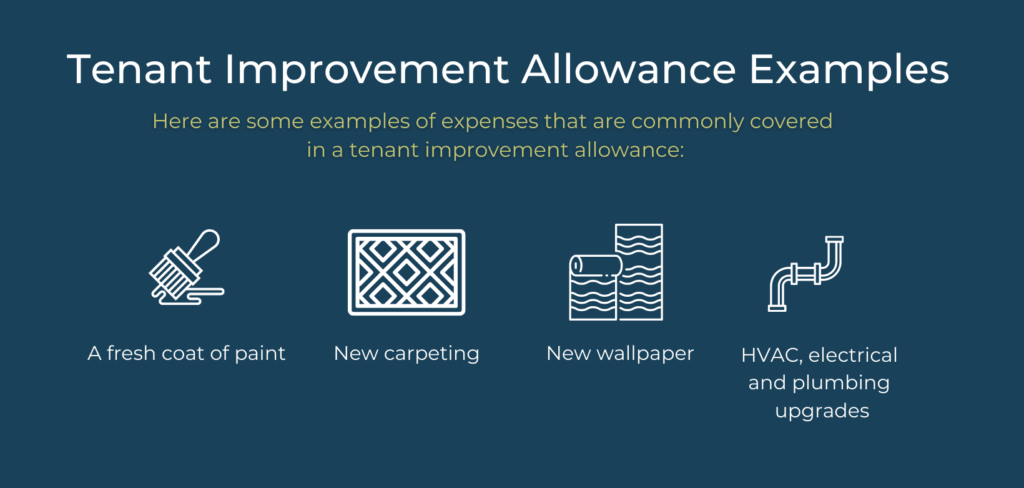Welcome to the topic “The Power of Tenant Improvement Dollars and Rent Abatement: A Strategic Guide for Businesses and Real Estate Brokers“
In commercial leasing, understanding the power of tenant improvement dollars and rent abatement is like unlocking a hidden treasure chest for businesses. These financial incentives not only shape the physical layout of a workspace but also influence a company’s bottom line. Let’s delve into the essentials, exploring why these factors are vital, how businesses can leverage them to their advantage, and the art of negotiation for real estate brokers seeking optimal terms.
Tenant Improvement Dollars: Transforming Spaces to Suit Your Vision
Why are Tenant Improvement Dollars Important?
Tenant Improvement Dollars, often abbreviated as TI dollars, are a financial boon for businesses seeking to tailor a leased space to meet their specific needs. This funding, contributed by the landlord, empowers tenants to undertake renovations, upgrades, or alterations to customize the space. Whether it’s creating collaborative work areas, installing specialized equipment, or enhancing the overall aesthetics, TI dollars breathe life into the vision a business harbors for its workspace.
How Businesses Can Maximize Tenant Improvement Dollars
Strategic Planning: Before entering lease negotiations, businesses should meticulously outline their space requirements and potential improvements. A clear plan helps in articulating needs to the landlord, ensuring that allocated TI dollars align with the intended modifications.
Negotiation Leverage: TI dollars are negotiable. Savvy tenants use the prospect of signing a long-term lease or committing to higher rent as leverage to secure more generous TI allowances. A well-prepared negotiation strategy can significantly impact the final agreement.

Prioritize Essential Changes: Businesses should prioritize improvements that align with their immediate needs and long-term goals. This ensures that the allocated funds are strategically utilized, delivering maximum value to the tenant.
Case Study: Maximizing Tenant Improvement Dollars for a Doctor’s Office
Scenario:
Dr. Smith, a seasoned pediatrician, is expanding her practice to a new location. The space she has leased is a raw canvas, and she sees the potential to create a warm, child-friendly environment that aligns with her brand.
Utilizing Tenant Improvement Dollars:
Customized Exam Rooms: Dr. Smith allocates a significant portion of the TI budget to create customized exam rooms. Child-friendly decor, interactive wall displays, and comfortable seating are incorporated to ease young patients’ anxiety.
Patient Waiting Area: Recognizing the importance of the waiting area in creating a positive first impression, Dr. Smith invests in high-quality furnishings, a play area for children, and a soothing color palette to enhance the overall patient experience.
Medical Technology Upgrade: To stay at the forefront of healthcare, Dr. Smith invests in the latest medical technology. The TI dollars contribute to the installation of state-of-the-art diagnostic equipment, ensuring top-notch healthcare services for her patients.
Staff Breakroom: Acknowledging the importance of a well-rested and content team, Dr. Smith allocates part of the budget to create a comfortable staff breakroom. This investment enhances employee satisfaction and fosters a positive work environment.
By strategically utilizing Tenant Improvement Dollars, Dr. Smith not only transforms the raw space into a welcoming pediatric clinic but also creates an environment that promotes the well-being of both patients and staff.
Rent Abatement: Financial Breathing Room for Businesses

Why is Rent Abatement Important?
Rent abatement, also known as free rent or rent-free periods, offers businesses a crucial financial reprieve at the start of a lease. This concession allows tenants to defer rent payments for a specified period, providing valuable time for the business to establish itself, undertake renovations, or accumulate funds before regular rent obligations commence.
How Businesses Can Leverage Rent Abatement
Business Launch or Expansion: For startups or businesses expanding into a new location, rent abatement provides the financial breathing room needed to navigate initial challenges. It allows for a smoother launch or expansion without the immediate burden of rent payments.
Renovation and Transition Periods: Rent abatement is especially advantageous when coupled with TI dollars. Businesses can utilize the rent-free period to implement renovations seamlessly, ensuring a smooth transition into the newly customized space.
Negotiate Inclusive Terms: When negotiating a lease, businesses should explore the possibility of inclusive rent abatement clauses tied to specific events, such as delays in construction or unforeseen challenges. This proactive approach safeguards the tenant’s interests.
Case Study: Leveraging Rent Abatement for a Law Office
Scenario:
Smith & Associates, a growing law firm, is relocating to a new office space to accommodate its expanding team. The partners want to ensure a smooth transition without experiencing immediate financial strain.
Leveraging Rent Abatement:
Transition Period: Smith & Associates negotiates for rent abatement during the first three months of the lease. This rent-free period allows the firm to seamlessly move into the new space, set up workstations, and ensure uninterrupted client service during the transition.
Technology Upgrade: Recognizing the importance of technology in the legal profession, the law firm allocates funds saved from rent abatement to upgrade their IT infrastructure. This includes investing in advanced case management software, upgraded computers, and enhanced cybersecurity measures.
Professional Development: The partners decide to use a portion of the saved rent for professional development opportunities for their legal team. This investment not only enhances the skills of the attorneys but also contributes to the firm’s overall competitiveness in the legal market.
Client-Facing Areas: Smith & Associates focuses on creating a polished and professional image in client-facing areas. The funds saved from rent abatement are used to upgrade the reception area, meeting rooms, and communal spaces, reinforcing the firm’s commitment to client service.
By strategically applying rent abatement, Smith & Associates not only manages the initial costs associated with the move but also invests in technology, professional development, and client-facing areas, positioning the firm for continued success in the new location.
Negotiating for Success: A CRE Broker’s Guide
Maximizing Tenant Improvement Dollars and Rent Abatement
Market Knowledge: A proficient real estate broker stays abreast of market trends and benchmarks. This knowledge allows them to negotiate from a position of strength, understanding the prevailing standards for TI allowances and rent abatement in a specific location and industry.
Client Advocacy: A broker should be a tireless advocate for their client’s needs. Understanding the client’s business objectives, growth plans, and space requirements enables the broker to secure favorable terms, including higher TI dollars and rent abatement periods.

Leveraging Competition: Creating a competitive environment is a potent negotiating strategy. Brokers can strategically engage multiple landlords or properties, leveraging the competition to secure more advantageous terms for their clients.
Building Relationships: Establishing strong relationships with landlords is a cornerstone of successful negotiations. A broker’s reputation for fair dealings and professionalism can open doors to more favorable terms and collaborative discussions.
Conclusion: Navigating the Landscape of Lease Negotiations
Tenant Improvement Dollars and Rent Abatement are not mere financial concessions; they are strategic tools that businesses can wield to shape their workspaces and financial trajectories. For businesses, thoughtful planning, strategic negotiation, and prioritizing immediate needs are key to maximizing the benefits of these incentives. Real estate brokers, equipped with market insights, advocacy skills, and strong relationships, play a pivotal role in securing optimal terms for their clients. As businesses embark on lease negotiations, understanding the significance of these financial considerations is the compass that guides them toward a workspace that not only meets their needs but propels them toward success.
Also read: Industrial Real Estate Property Chicago: A Booming Sector
TAGS